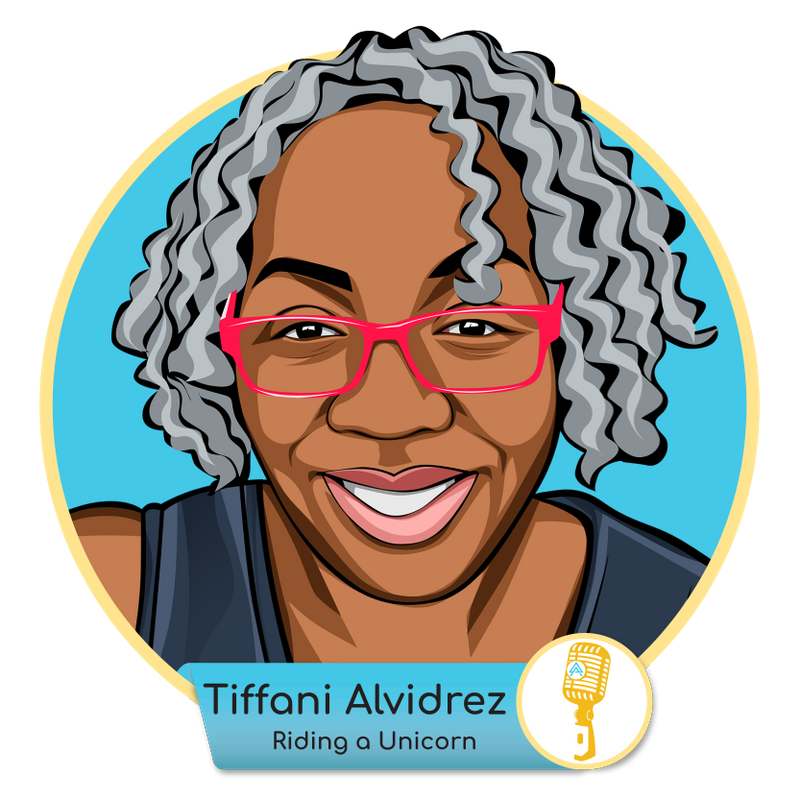Startups and corporates need each other. But most partnerships fall apart. In this episode, Ian Bergman talks with Noga Tal about what actually makes these relationships work.

AlchemistX: Innovators Inside
E.18 - Tiffani Alvidrez: Riding a Unicorn
Published on
"Government speak is different and government speak is not always interested in learning other languages.I think that fundamentally presents the challenge between government and the tech industry." - Tiffani Alvidrez
Tags:
Show Notes
Rachel Chalmers:
Today, we are so happy to have Tiffani Alvidrez on the show. Tiffiny joined Instacart as its Public Policy Manager in January after a dazzling career in government that began in the California state legislature and culminated in a 10 year term as Chief of Staff to the California State Senate to Holly J. Mitchell. Along the way, Tiffani served as policy analyst to the California Department of Transportation and Drug and Alcohol Programs and special assisted in the California governor's office. Now she brings that wealth of public policy experience to one of the Valley's best-known unicorns.
Tiffani, thank you so much for taking the time today.
Tiffani Alvidrez:
Thank you for having me. I really appreciate this opportunity to spend some time and chat.
Rachel Chalmers:
It's such a pleasure to have you. Joining a late stage venture backed company is a big departure for you. We were talking about how you've been a public servant for so long. Can you tell us more about the role at Instacart and what it was that drew you to it?
Tiffani Alvidrez:
Absolutely. My official title, at Instacart, is the Western Regional Policy Manager. Which means that I do in-house government relations for Instacart covering the western part of the United States. So I have approximately eight to ten state territory in which I interface with state government and local government and make sure that I am representing Instacart’s interest on the West Coast.
And I think Instacart is an app based platform that focuses primarily on grocery delivery. There are a lot of technology companies that are doing a lot of different things, and we certainly have our fair share of app based platforms, third party delivery systems that are also doing a variety of things. One of the things that attracted me most to Instacart was the fact that food security is in its mission statement. And that was significant for me. That felt like a righteous connection coming from government, coming from a career as a public servant. Spending the last 10 years as chief of staff to a former state senator who focused on human services. Who focused on food deserts and access to healthy food, that it felt like a more natural transition.
Rachel Chalmers:
A lot of Silicon Valley companies have this sense of mission, and it's easy for those of us who are immersed in the tech industry to become a little bit cynical about those larger elements. But it's a big reason why Silicon Valley continues to be a beacon for incredible professionals such as yourself.
Tiffani Alvidrez:
I agree. I think in as much as the vision statements may feel idealistic sometimes, they really do make that human connection. It makes whatever the technology company is focused on, it makes it real because at the end of the day, the end user is a human and a person. In Instacart’s perspective, that end user is a person who needs access to fresh foods. I thought that was a wonderful connection that worked really well with my life's perspective and kind of my personal convictions.
Rachel Chalmers:
For those of us who grew up in the post-West Wing world and had that same kind of idealism about government. It's a beautiful overlap to think that these large infrastructures that we're building can be done to purposes of service rather than just making huge amounts of money for billionaires.
Tiffani Alvidrez:
That’s an excellent way to put it. So then my role when it comes to government affairs and public policy, is to provide that translation. To translate tech and tech purpose and technician to government service, to bridge that gap. So that we can figure out how we are partners. So that we can figure out how government can not feel like it's being so onerous in its regulatory requirements and that it is regulating the industry or promulgating policy in a vacuum. But we could be partners in this.
Rachel Chalmers:
Right, because we've come through a long run of a certain amount of antagonism between tech giants and the federal government as well as the states. There's a strain in tech which is about finding natural monopolies, which boils down to arbitraging opportunities by destroying other industries that are deemed to be underperforming. It's really encouraging to talk to somebody who's trying to find win-win solutions out of what's so often framed as a zero sum game.
Tiffani Alvidrez:
Absolutely. I think that it is important that we find ourselves in positions of support versus always the default of, “No”, and kill strategies for bills. And I think it's important that tech is a partner with government in its regulatory and oversight role of emerging industries. I think that that's critical.
Rachel Chalmers:
So where do you think your very specific experience, particularly in the California state legislature, can help Instacart, particularly in being more innovative around challenges like food deserts?
Tiffani Alvidrez:
Well, my hope is as it relates to Instacart to government - Actually, let me do the reverse, government to Instacart. My hope is that I'm able to translate language. That is a skill set and it's a soft skill, but it's a very valuable skill where you can take what one entity is saying and translate it into a language that is comprehensible and understandable for another entity. So my hope is to be able to translate government speak to tech and tech speak to government. Specifically as it relates to Instacart.
For me, my goal is to really kind of educate the legislature on what it is that Instacart does. Even though Instacart has been around since 2012, for a lot of electeds, to them, it feels as though it burst on the scene during the pandemic. That this is a brand new company. And it's like, “Yeah, no, no. No. We've been grinding away since 2012 and this has been our business model and we've been working our business model for quite a bit of time.” The pandemic definitely created an opportunity for Instacart to step up and provide support for essential workers in the front line workers which would be our largest retail partner, which is grocery.
The reality is that Instacart has been doing this work and filling this need since 2012. Our largest retail partner is grocery and fundamentally we're there to kind of prop up and support brick and mortar. My hope is that I can bring awareness to the legislature of who Instacart is outside of the shadow of proposition twenty two. To come out from that and educate the legislature on who we are and what we do and figure out ways in which we can continue to exist in California and other states.
Rachel Chalmers:
For our non California listeners, Prop 22 was a California direct ballot proposition which sought to redefine gig workers as employees. Which was opposed by a lot of the large Silicon Valley companies because it would have such a damaging effect on their business models.
Tiffani Alvidrez:
And opposed by organized labor.
Rachel Chalmers:
Yes. I want to go back to what you said about Instacart being an overnight success 10 years in the making. Part of what makes translating between these different domains so challenging is that elections have both a longer and a shorter time horizon. They're thinking about getting reelected and they're also thinking about 10, 20 years into the future of the state. At the same time, you've got these tech giants and they plan in three to five to seven year cycles. Sometimes the miscommunication is just because the timing is off. How do you match those different calendars?
Tiffani Alvidrez:
Well, it's a matter of knowing the calendar, understanding the calendar and being able to work within that rhythm. I come from the California state legislature, so I'm steeped in that legislative rhythm, that cycle of rhythm of how things move and progress. I'm also familiar, more than familiar - since I've been working in the space for more than 20 years, more than familiar with political influences, outside influencers, stakeholders, election cycles and political and public platforms that elected are using to either promulgate their policy, represent their constituency and get elected. So it's all of that kind of mix that comes into play for you to understand how you navigate a space. And that's where experience comes in.
Rachel Chalmers:
So when Instacart wants to have input into a piece of legislation, you can provide guidance both on the form and on the correct moments at which to approach legislators in order to have maximum impact.
Tiffani Alvidrez:
Absolutely. And then sometimes provide context. Most instances you want to be able to provide context as to intent. You can provide a historical context. This particular legislator has had an issue with X, Y, Z, one, two, three. And this has been an issue that recently cropped up in their district. It's played out all over their major newspaper. And now here we see policy being introduced to address that issue. To be able to provide that type of context to a piece of legislation. Also, I think helps this relationship and this dance, because then it keeps in Instacart from feeling like we’re in a bullseye. That this particular elected official sees us as public enemy number one. That's not always the case.
In some instances that is the case. Sometimes that's the case. But in most instances it's not. It's that the legislator is trying to be responsive to an issue that has been a pervasive problem in their district for their constituents. It's a matter of providing some context. So not only is it points of entry for influencing or shaping legislation, but it's also context. And then it's also what flashpoints are. It's understanding what's the landscape in the legislature today? What are they inclined to work on? How are they prioritizing things? How are they prioritizing issues? Do we have someone who is embattled and feeling particularly politically prickly? It's all of that. It's a lot
Rachel Chalmers:
Who particularly needs a win this term?
Tiffani Alvidrez:
Who needs a win. How much political capital do you really need to expand on this issue? How much is a lift? It's A lot of conversation.
Rachel Chalmers:
That old joke, which isn't a joke. As goes California, so goes the nation. We are such an unbelievably diverse state in terms of income disparity, in terms of being one of the world's biggest producers of food, as well as having these food deserts in our urban centers and not only in our urban centers, we have rural food deserts as well. It's one of the things that has always made the state an unbelievable playground for innovators. But it also makes it enormously challenging to govern, I would imagine.
Tiffani Alvidrez:
Absolutely. And one of the things that we often joke about with my counterparts in Instacart is that California literally feels like three states in one. So covering California, covering public policy for California, really, it is a challenge. And again, it does feel like three states and one for its size, but also because of its geopolitical diversity that's in the state. The regional diversity as well.
You mentioned our rural areas that literally feed the world. I'm born and raised in the Central Valley, and that's very near and dear to my heart and agricultural rural stretch of space in the middle of California. That is the world's food basket. And the irony is not lost on me that being raised in kind of an agricultural powerhouse that feeds the world, that there is such food inequity. That there is hunger, that hunger, that there is hunger. When I was a kid, I could walk out of my front door and I could look to the right and I could see corn crops. I could look to my backyard and I could see nectarine orchards. I can look to the left and I could see plum orchards. I could look right in front of me. And see grape vines. And that feels as though there's this abundance of food, which there is, that unfortunately is not accessible to its own community. Not to mention the income inequality. So it really does make California a very different space to work.
Rachel Chalmers:
Both of those aspects of California are so true coming here from Australia. It's hard to overstate how fertile it is here. We're at the confluence of the San Joaquin River and Sacramento rivers. It's volcanic soil. It's churned up by floods every spring. You basically drop an almond. The next week you have almond orchards. This camomile growing in the sidewalk, cracks in San Francisco. The same camomile that you make tea with. It's a ridiculously rich and abundant land. And yet, as with the water, which we ship in through the Owens Valley, there's been this enormous move towards privatization. The results of those movements have been very inequitable. The outcomes have led to this huge disparity.
Tiffani Alvidrez:
Not to mention the public policy fights. RThe huge and explosive public policy fights around water rights. My goodness.
Rachel Chalmers:
Which all makes it a perfect mirror of the tech industry where many of the same things are true. We have these two incredible universities. We have this huge magnet for engineers and a few people get enormously rich and a lot of people are sleeping in tents on the streets. And it's what makes California so endlessly compelling that the opportunity, the promise here and also so frustrating because of all of the ways in which we fall short of what should be possible.
Tiffani Alvidrez:
Absolutely. It's an excellent way to frame it.
Rachel Chalmers:
Why do you think we struggle so much in bridging that gap? Why is it so hard for tech companies to work together with government? Why is it so hard for governments to achieve the outcomes we would all like to see?
Tiffani Alvidrez:
I think it's hard for tech companies to work with government because government moves so slowly. The layers of bureaucracy are very real and they can be very, very frustrating. That is not an overstatement. It is a reality. And I think that is difficult for the tech industry. I think it is difficult for government to work with the tech industry, not so much because they perceive the tech industry as being lightning quick, but because of a language barrier. Government speak is different and government speak is not always interested in learning other languages. And I think that fundamentally presents the challenge between them and the tech industry.
Rachel Chalmers:
That's really interesting and provocative. In our work in corporate innovation, we work with bureaucracies which are large and slow. But it's probably true that even a multinational moves more rapidly than a government because it's a public company. It has to answer to quarterly analyst calls rather than having a four or six year term right there.
Tiffani Alvidrez:
There are ifferent drivers, it's a different driver.
Rachel Chalmers:
How do you identify the areas where we do have shared goals?
Tiffani Alvidrez:
Honestly, I think that we have shared goals in the majority of areas. Because whether a tech company is looking at a consumer or an end user, they are the same individuals that government is looking at our programs and services. I think 95 percent, if not more of the issues we have shared goals in. The challenge is figuring out how to work together to one, identify with the shared goal is and then two, to be able to work together so that we have mutually beneficial outcomes with the final outcome being that the human benefits.
Rachel Chalmers:
It is so exciting when these private partnerships work together. Like with the vaccine rollout. Just being able to go to a website and find appointments at public clinics or private clinics and get your vaccine free. It's a glimpse of a better future.
Tiffani Alvidrez:
It is. And I think that the key there is political will. Most anything can be accomplished if there's political will. All of a sudden, government figures out a way to get out of its own way. It's kind of remarkable. The pandemic has shown us that government does possess the ability to be nimble. They really do.
Rachel Chalmers:
Yeah, but the political will is elusive. This is one of the reasons I've been a Star Trek fan since I was a little kid. And it's still amazing to watch the franchise still going. People are just having faith in the federation as a way for people to work together and build science.
Tiffani, if you had one do over, what would you do differently?
Tiffani Alvidrez:
I'm assuming you mean from a professional perspective.
Rachel Chalmers:
Some folks have taken that question - I ask it of all of our corporate innovators, as a personal project. So take it how you will. The answer is always interesting.
Tiffani Alvidrez:
Honestly, I have to say, I have a remarkable life. My life is so incredibly rich and blessed that I don't live in a space in which I walk with regret. I fundamentally believe that every decision, every move, every outcome has been exactly what it was supposed to be for me or however I've been purposed or whatever my purpose on this earth is. So I don't live in a space of regrets. I certainly can imagine what I would do differently professionally because my professional arc has been influenced by my personal decisions. As women, unlike most men, we have to prioritize differently. We prioritize, at least for my generation, not speaking about anyone under 50. But for my generation, for me personally, after graduating from college, I prioritized relationship, I prioritized family. I prioritize my ambition along with that. Every person has probably three top things that are the three priorities in their lives. And those top three things, the position of one, two and three, vary depending on what season you're in your life.
So I prioritized family, children, profession, and ambition. And my professional career has been so closely influenced, so absolutely influenced by my personal decisions that I can't possibly have any regrets about how it turned out. There were times in my career and which I had to pause because I was either having children or raising children. And I had to stop and reassess my priority. OK, how was this professional move going to impact my ability to be the type of parent that I choose to be? You know, it's been that give and take. I am very pleased with where I am professionally, and I think there's more to come. I think I'm just getting started.
Rachel Chalmers:
I do, like you. feel incredibly fortunate to have been able to raise a family and have a career. It was a lot easier for me than it was for our mother's generation for sure. Back to how amazing California is. Having a normal middle class life here is the equivalent of being a medieval king. You know I turn on the faucet and hot water comes out of my shower and it's brilliant. There's a farmer's market down the street with all of this incredible food. And the entire San Francisco Public Library is on my little electronic book. It's such a rich life. It's such an abundant life. And I think just wanting other people to have that same level of basic gratification. You're right. That's probably what we all share.
Tiffani Alvidrez:
I absolutely agree. So I don't I can't think of anything that I would do differently. I can't think of one single thing. I think that every single decision that I've made has led me to this very moment. And I am thankful in this moment.
Rachel Chalmers:
How might you distill your years of legislative experience into a few lessons for our listeners who are corporate innovators as they're thinking about engaging with the public sector, maybe selling to government departments? What insights can you share?
Tiffani Alvidrez:
Honestly, I would say it is important that you prioritize public policy. Prioritize it for your companies, prioritize it for your own sake. I find it baffling that startups and mid-level tech companies don't consider public policy as a viable business line in their business model, especially when you are going to be working and growing in a space that at some point you're going to hit a radar in your growth and regulations are going to come. Wouldn't it be remarkable if you prioritize public policy and educated policymakers along the way and been able to be at the table to help shape some of those regulations that will govern you? So definitely prioritize public policy. I don't think it's ever too late. Another thing that I would say is, it is important, it is critical to have people and voices around a table that are in decision making roles that don't all look the same.
Rachel Chalmers:
Oh, yes.
Tiffani Alvidrez:
Diversity, inclusion, equity, it all matters. It matters. You may feel that it's a bit too altruistic for whatever your business model is, you will reap rewards untold for having a diverse set of decision makers at the table in the front end.
Rachel Chalmers:
It's not even getting too deep into the headlines to say that once again, a big tech company, in this case Slack, has implemented a feature that if they had asked a single woman, they would not have implemented. This is the feature to DM a member of a different Slack group, which inadvertently gives you access to all of the members of that other Slack group. Any woman who has ever fled abuse or who has a friend who has fled an abuser and had to conceal their address and location would immediately say, “Don't do that.” And we have in fact, been saying this for 10 or 15 years since at least Google Buzz, which implemented similar features. And yet it happens over and over again. And it's such a telltale, you know, exactly who is at the table.
Tiffani Alvidrez:
It is important, you have to prioritize that. They have a responsibility. We have a responsibility to do better. When you know better, you do better. You know better. So do better.
Rachel Chalmers:
I loved your first point, too, because we're talking about founders who would never dream of going and pitching a VC without laying the groundwork first. They build a relationship, they share insights, they share challenges, and then when they go into the fundraising meeting, that's a relationship deal. When it comes to dealing with legislators, it’s a totally different attitude. It's just like, “We'll see you in court.” That's not the way to build anything.
Tiffani Alvidrez:
That can't be the default. It can't continue to be the default.
Those are things that I think about. Particularly being new to tech, being relatively new to tech and being a black woman. Of course, those are things I think about. And I think that we all have a responsibility to think about those things.
Rachel Chalmers:
And for all of us, our background, our history, our culture, our family are unique experiences, they’re the value we bring.
Tiffani Alvidrez:
It's part of the value. Absolutely. And it's not an or and you're not compromising anything.
Rachel Chalmers:
If anything, you're raising the bar.
Tiffani Alvidrez:
Absolutely.
Rachel Chalmers:
How do you think the pandemic might affect our economy in the longer term?
Tiffani Alvidrez:
That's a very good question. I think we are going to have a lot of challenges ahead. I think that from a California perspective, we are so inextricably connected to the rest of the world that if we don't all figure out the vaccinations and how to kind of fully wrap our arms around the pandemic. I’m talking the infection rates, the death rates, the hospitalizations, and that's not just in the United States, that's in South America etc. Close your eyes and pick anywhere on the globe - that if we don't figure this out collectively, I think it's going to have a significant negative impact on our economy and our ability to recover.
Rachel Chalmers:
We are still probably what, the fifth largest economy in the world? And a lot of that is because of the shipping that comes through the Golden Gate. And it was so brought home to us when the Pacific Princess, one of the early cruise ships that suffered an outbreak of the coronavirus, was docked in the same Oakland as all of our cargo shipping.
Tiffani Alvidrez:
It was evident and we experienced lack and shortage. And there were runs on toilet paper and all sorts of commodities. And I think if that didn't drive that point home, I'm not quite sure what would. Same as with most recent ocean carrier that had run aground in the Suez Canal and folks were freaking out about what does this mean for our commodities?
And so I think that we're so inextricably linked globally that if we don't collectively figure out the pandemic, that we're going to see some damaging effects in the immediate run. I think that we have benefited from all of the federal help that we've received because it has definitely helped buffer us against another Great Recession like we experienced in two thousand eight, nine and ten. That's not sustainable. That type of federal aid is not sustainable. So I think that we're going to have some challenges.
Rachel Chalmers:
More rough water ahead.
Tiffani, you do so much. You do so many things. How do you personally avoid burning out?
Tiffani Alvidrez:
Oh, good Lord. You know, I don't... That’s not a fair question. Because I don't really... That's not fair because I don't really think - All the balanced… Find a work life balance. That doesn't really - I think it sounds fabulous. But it is very difficult to achieve from a practical perspective, especially for me. I'm a single parent of four and they are all in very different phases of their lives. Self care and balance is never really a thing. I'm doing really well. If I can get more than five hours of sleep, I feel like a brand new woman. W
The one thing that I can say though, that does keep me centered, is that I have a foundation of faith. Unapologetically, a foundation of faith. And that is where my help comes from. That keeps me centered. That gives me hope. That calms me down when I'm stressed because I know that there is a higher power guiding my life so that I can release all of these things that I cannot control. And so that is what fundamentally kind of gets me through when I'm feeling a bit out of sorts.
Rachel Chalmers:
That's a deep answer in two ways. One, because you and I both know that individualized solutions to systemic problems just shift the onus of change onto the individual who doesn't have the resources of the system. And then faith and appreciation of life beyond life. Time beyond time. It is really the only way to center yourself in those situations of fundamental injustice.
Tiffani Alvidrez:
And you have to believe that there are things that are bigger than you. You have to believe that. You cannot go through life thinking that you are the center of the universe and that all that happens to you is the only thing that matters. We're connected all in some way to something more. So for me, having the foundation of faith, that is what's helped me all of this time. Those are guiding principles. Which is why I don't have regrets.
Rachel Chalmers:
Even the most secular technocrat can hardly mount a decent argument against that when so much of the literal economy we've built here is about enabling connection. It's about digitizing those cargo lanes and those shipping lanes around the world.
Tiffani Alvidrez:
That's a beautiful way to put it. It's an excellent way to put it.
Rachel Chalmers:
Tiffani, what is the best way for our listeners to connect with you or follow you?
Tiffani Alvidrez:
You're welcome to connect with me either via my LinkedIn. You'll be able to follow my personal and professional interests, because that's where I tend to express my public policy views and my own personal passions as it relates to climate change and global inequality. You're more than welcome to email me at Tiffani.Alvidrez@Instacart.com.
Those are probably the best ways. I try not to have too large of a social media footprint, even though clearly I have. But I'm not particularly active on a lot of platforms. I think it's probably because - As a former chief of staff to a former state senator, I've grown up professionally being very careful about publicly platforming my own interests. Because a lot of times the work that we do is to serve a person or serve government. And sometimes the things that we believe run counter to that. And so I've always been acutely aware of my own personal and political passion things, and putting those out there because it could be counterintuitive to an interest I'm serving.
Rachel Chalmers:
I understand completely. But one of the things that I've enjoyed about growing older in the tech industry and as a woman growing older in the tech industry, you have to take your pleasures where you can find them. It’s that the risk of a career limiting move really diminishes over time.
Tiffani Alvidrez:
I agree that is an excellent way to put it.
Rachel Chalmers:
People either know what they're getting with me or they don't. And, you know, I am what I am. I'm not going to change.
Tiffani Alvidrez:
And even if they don't know what they're going to get, they're going to figure it out pretty quickly. Absolutely.
Rachel Chalmers:
So I do feel a certain amount less inhibition than I did ten or fifteen years ago about talking about what's important to me. Even on my public Twitter.
What does the future look like for you personally? Are you going to have anything other than onboarding to Instacart in your near future?
Tiffani Alvidrez:
I don't know. I'm very hopeful. I am very excited about learning this role and learning it well. That is very, very important to me. I'm certain that I do not know I will be working for a very long time simply because I enjoy it. And hopefully that time will be spent within Instacart. You know, we'll see. We'll see. What's nice is that I have options. And it's one thing that I've always told the kids, which is when they grumble and complain and they'd say, “You know, why are you making me do this? Why are you making me do this? You know, I don't want to do this. I hate this.” And one of the things that I would say is, “It's important for you to be in a situation in which you can choose, in which you have options. So that the only thing before you isn't, well this is all that I can do, this is all that's left.”
And so I am fortunate that I have options. So we'll see. My kids range from adults to teenagers at this point. But the sweet spot for me is, you know, I get that you have this passion-work. I get that you love this thing. I get that this is the center of your universe right now. But I'm going to need you to do that thing that you love so much and figure out how to monetize that so that you can support your own passion so that you're not looking to me to support your passion.
Rachel Chalmers:
Ok, Tiffani, for the next five years, everything turns out exactly the way that you hope it will across the tech industry. What will the world look like in five years?
Tiffani Alvidrez:
In five years time, the world looks like a space that all aspects of technology are available to everyone. It looks like a space in which we don't have challenges with wireless internet and broadband issues and space in which children can't learn. It looks like a space in which people have plenty to eat at a minimum, enough. It looks like a space in which criminal justice reforms are adopted and intrinsic and communities don't feel as though it is open season on them. It looks like a space that celebrates differences.
Rachel Chalmers:
Are you sure you don't want to run for office?
Tiffani Alvidrez:
Oh heavens no.
Rachel Chalmers:
You’ve got my vote! But yeah, unfortunately, you know what's involved.
Tiffani Alvidrez:
Of course, I'm missing a whole lot of other stuff in my idealism that, you know, the world would look like. This is the word I'm pushing for. This is what I hope is my small contribution towards that outlook. It looks like a space in which, you know, mental health is normalized. Which people feel comfortable in their own skin.
Rachel Chalmers:
It doesn't sound like a small difference to me. It sounds like a very big and important conversation.
Tiffani Alvidrez:
I agree. So we’ll see.
Rachel Chalmers:
Tiffani, it's been such a delight having you on the show. Thank you so much. I would love to have you back in a year when you've been immersed in Instacart, and hear what you think of the tech industry and whether you still like it.
Tiffani Alvidrez:
That I'm sure I will. I have already made up my mind that I'm going to love it. So since I've decided that I am going to love it, it's going to happen. And I would be delighted to see you again in a year, if not sooner.
Rachel Chalmers:
Thank you so much.
References
Tiffani Alvidrez on Linkedin
Tiffani Alvidrez on Facebook
Tiffani Alvidrez on Instagram
Tiffani.Alvidrez@Instacart.com - Tiffani’s professional email address
Instacart - Where Tiffani currently works as Public Policy Manager
Holly J. Mitchell - Who Tiffani worked for when a part of the California State Legislature as Chief of Staff
West Wing - A show Rachel references to bring up Governmental idealism
Rachel Chalmers on Twitter
Intro and Outromusic composed by: www.PatrickSimpsonmusic.com
Recent Episodes
.jpg?width=767&name=IIS7%20SQ%20Thumbnail%20(1).jpg)
In this episode, Marcelo Calbucci breaks down the innovation habits that shaped his career at Microsoft, Amazon, and across six startups. He explains why small, fast iterations beat big plans, how narrative-driven strategy unlocks clarity, and why today’s founders should embrace niche, hyper-specialized solutions.

In this episode of Innovators Inside, Hong Kong–raised entrepreneur and two-time TEDx speaker Yunsu Tang shares her journey from a stable corporate career in Hong Kong and Shanghai to rebuilding in London’s startup ecosystem.
.svg.png)








